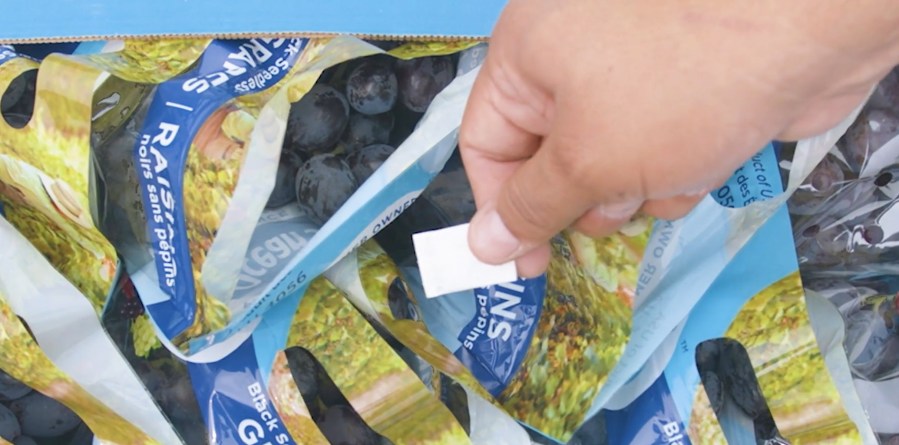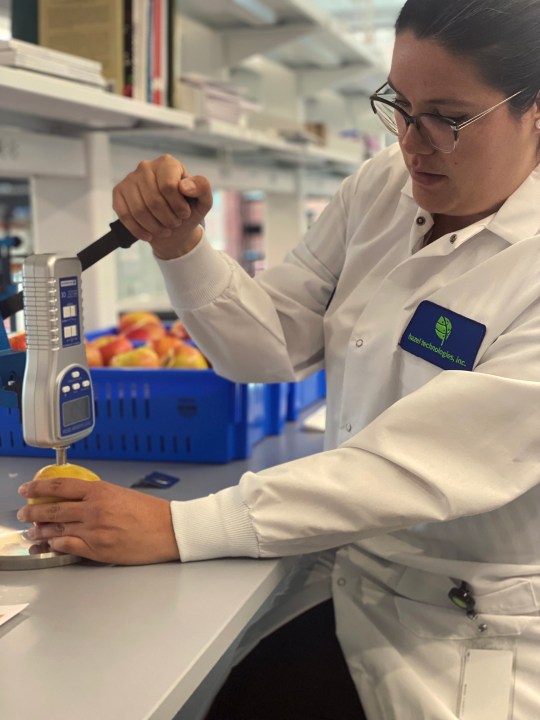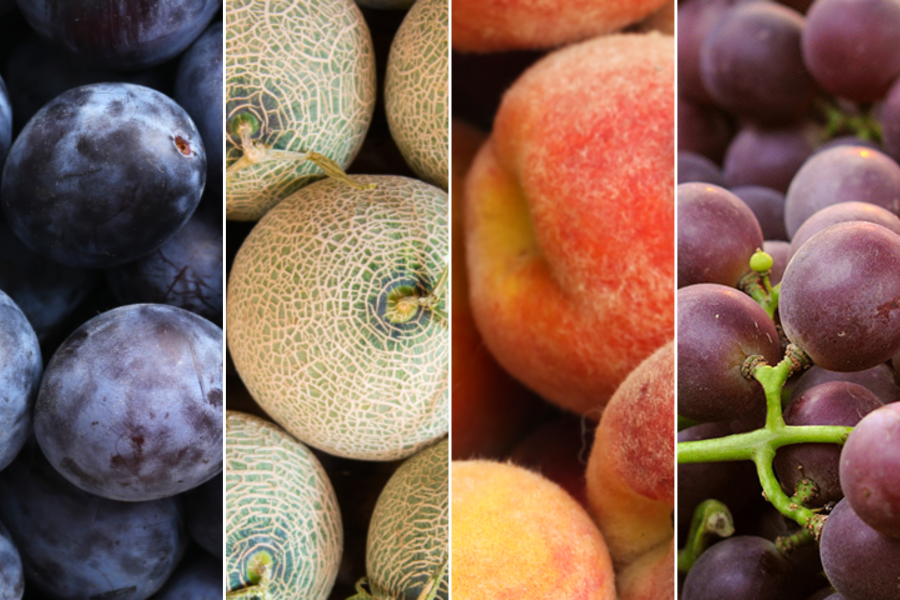Slowing the clock on produce to reduce food waste

Patricio Mendoza looks at the grapes of one of Oppy’s growers. Mendoza says Hazel’s technology has extended the life of their fruit by up to three weeks. Courtesy of Hazel Technologies.
(NewsNation) — Food producers face myriad obstacles — supply chain issues, climate change, rising inflation — but particularly for fruits and vegetables, time is working against them. A Chicago-based company is trying to buy consumers more time to enjoy their produce while also cutting down on food waste.
Hazel Technologies is a startup company that develops products to slow the spoiling process, meaning fresher food for the consumer. Produce treated with Hazel has a 40% increase in shelf life compared to untreated fruit, reducing food waste and carbon emissions, according to Adam Preslar, chief technology officer at Hazel.
The solutions Hazel promises are especially attractive as war, high costs, extreme weather and other factors take an increasing toll on the global food ecosystem. In the U.S. alone, 30% to 40% of the food supply is wasted, and food waste is the single largest contributor to local landfills, according to the FDA.
“Our food system as a planet needs more solutions to be able to have coverage,” Preslar said. “That all connects as part of the journey of making a worldwide food system.”
Complex science, simple solution
Green stems are a key mark of fresh grapes, and that’s what grocers like Patricio Mendoza look for.
Mendoza works for the produce company Oppy, importing fruit from all over the world into U.S. grocery stores. He said the Hazel technology extends the shelf life of their grapes up to three weeks, compared to fruit without any treatment.
Those extra weeks may help farmers and distributors weather uncertain shipping times and reduce the amount of wasted produce.

“What our growers are facing now, every year it’s more difficult to produce fruit,” Mendoza said. “Climate change, labor, lack of technology — the cost of that is a shorter period of life.”
Hazel’s solution: small packets, dropped into the packaging of produce, slowly releasing anti-aging chemicals for up to three weeks. The exact dosages of those chemicals change depending on the fruit. The company website says all are food-safe and regulated by the U.S. Food and Drug Association.
Compared to other products that extend shelf life, which can require large equipment, high overhead costs and new training, the ease of Hazel’s products is attracting many growers.

But while the conveyance is effortless, there are complex calculations that go into when and how these packets are used. The goal is often for the fruit to ripen within a day or two of the consumer buying it.
Hazel’s packets slow down produce’s natural maturation rate and fungal growth — both of which contribute to how fast a piece of fruit spoils.
Each fruit or vegetable comes with a list of other factors to consider. Kiwis coming from New Zealand will likely need more shipping time than cherries from Washington. Some fruit will halt aging when stored at freezing temperatures; others get freezer burn easily. And the decision to ship by air versus by sea has huge implications for not just the company’s bottom line, but the price tag the customer sees.
“A lot of fruit has to travel so far to begin with. Then imagine adding two more weeks,” said Mario Cervantes, who works in business development at Hazel. “Imagine opening a container and it looks like guacamole. (Growers and distributors) are not going to be paid for the quality of their fruit.”
The packets don’t currently work for all produce; the company works with 15 different types of crops. And shipping delays have left many in the agriculture world distressed, particularly those growing tropical fruit, which is easily damaged. Some are combining Hazel’s packets with sprays or coatings that delay aging offered by competitor companies.
Still, there’s a lot more work to be done to diminish the massive amounts of food wasted worldwide, said Katy Hart, operations director at ReFED. The nonprofit uses data to analyze how companies impact food waste, including Hazel Technologies.
“Ultimately, we need more Hazels,” Hart said. “We need more investment in (similar) solutions, because one of the main challenges to getting these types of solutions off the ground is funding. … We need more data on how well these solutions are performing so far.”
Impacting inflation, the climate
An estimated $161.1 billion worth of food goes to waste each year, according to the U.S. Department of Agriculture, and 27% of that happens in the period after harvest but before consumption.
“If we cut food waste in half … it would reduce greenhouse gas emissions by 75 million metric tons annually, which is the same thing as taking 16 million gas-powered cars off the road,” Hart said.
That waste can happen anywhere along the food supply chain, from labor shortages causing crops to rot in the field to a distributor or grocer rejecting still-edible produce that looks past its prime, she said.
Hazel authorities estimate they’ve saved more than 460 million pounds of food waste in the past seven years working with 300 companies across 12 countries.

“When talking about wasting a kilogram of avocados, it goes back to land, water, fertilizer, crop inputs, time, people’s driving to work, all the little, little pieces that kind of come along for the ride,” Preslar said.
During economic distress, food waste means higher prices for consumers — who may see a 14% increase in grocery prices this year according to a KPMG study. It’s also harder to feed low-income consumers who may rely on social services to keep enough food on the table.
Unfortunately, eliminating food waste likely won’t significantly impact prices at the grocery store short term, Hart said. That’s because food waste is just one piece of a more complicated pull between supply and demand. Yet everything consumers do to reduce waste may also save them money as well.
“Americans waste an average of $1,600 annually in wasted food,” Hart said. “For many Americans, that’s a significant amount of money that they could be saving, which makes a huge difference during periods like inflation.”














